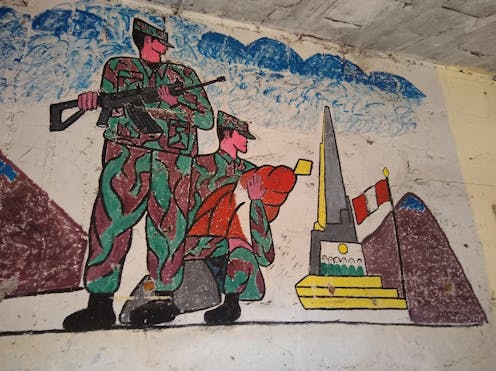
Ten retired Peruvian soldiers were convicted in June of raping nine women while serving at the Manta and Vilca military base in the Andes mountains during the country’s armed conflict in the 1980s. The men each received sentences of between six and 12 years for crimes against “good manners” and “sexual liberty” under the Peruvian criminal code, and for crimes against humanity under international criminal law.
This is a historic conviction both for Peru and the world. It shows that it is possible to convict perpetrators of systemic sexual violence in conflict zones. And it also demonstrates that domestic courts do have the tools and wisdom to enforce accountability, even in the current context of high corruption and political interference with the judiciary.
The rapes were committed at the height of the government’s fight against a Maoist rebel group called the Shining Path. The rebels were active mainly in poor and rural regions of Peru, and indigenous villagers were often caught up in the violence.
The Peruvian Truth and Reconciliation Commission (TRC) was set up in 2001 under a transitional government to investigate the human rights abuses committed during the conflict. In its final report in 2003, the TRC concluded that sexual violence was widespread and particularly systemic on the part of the Peruvian military. However, no former soldiers have been prosecuted for sexual violence until now.
Testimonies to the TRC and subsequent research show that sexual violence was not explicitly adopted as a policy, but it was perpetrated by violent men whose actions were tolerated and often encouraged by superiors in the military hierarchy.
Research on both Peru and the Democratic Republic of Congo shows that much of the sexual violence committed during conflict is facilitated by gendered patterns of power and myths about men’s need and right to sex, and women’s perceived availability to provide it. There is also evidence that suggests sexual violence is used in wartime as a bonding mechanism between men.
My own research project from 2023 with Peruvian ex-combatants showed the entanglement of notions of sex and violence among former soldiers, as well as how the military as an institution violently moulded young men into being capable of committing atrocities.
The recent sentencing is reflective of this. In their judgment, the judges carefully outlined why they considered the acts to be crimes against humanity. And they sentenced both the direct perpetrators and the commander in charge of the military base in question.
This historic conviction was somewhat unexpected. The trial was mired in controversy, and was certainly not an example of transformative gender justice being practised well.
The case, which is known as Manta y Vilca, progressed very slowly. It also showed signs of prejudice against the claimants, who are all indigenous Quechua-speaking women from the rural Andes. And the case was mis-trialled in 2018 after one of the judges was implicated in a political corruption scandal and had to be restarted in 2019.
It has only now concluded 40 years after the crimes took place, and 21 years after the TRC first identified the case for prosecution. The victims have been captive in these prolonged and difficult proceedings for far too long.
Nevertheless, the conviction must be viewed as a victory for women who were raped, and for the human rights advocates who have patiently worked to get to this result. Pursuing justice for conflict-related sexual violence continues to be complex globally, despite its widespread occurrence and the amount of knowledge gathered about its use and practice in conflicts around the world.
In addition, the indigenous population of Peru has long been ignored and neglected by the state. This is particularly true in the Quechua-speaking highlands, where people have often been deemed “terrorists” since the conflict.
Racist and sexist prejudice continues to this day and was reflected in the line of questioning of some of the defence lawyers, and in the response of some of the media in Peru. So, the fact that the judges in this trial listened to the statements of the nine women and believed them, reiterating this repeatedly in the sentencing, should not be underestimated.
Preventing accountability
Unfortunately, the decision came 12 days before a Congressional committee approved an “impunity law”. This law will grant amnesty to all Peruvians who committed human rights violations before July 1 2002.
As a result, no further cases related to gross violations of human rights committed during the conflict can be brought to justice. Prosecutions for crimes including rape, forced disappearance, mass murder, forced sterilisations and torture have been limited and highly complicated anyway. But this amnesty will make it impossible.
The law comes from a corrupt government with very little legitimacy. It is led by an unelected president in Dina Boluarte who currently has an approval rating of only 8%. And its Congress includes several ex-military personnel, and many “Fujimoristas” who continue to support the political grouping around former president Alberto Fujimori and his daughter Keiko.
Fujimori, who ruled Peru with an iron fist throughout the 1990s, was convicted of corruption and human rights violations in 2009. He was imprisoned for life, but was subsequently released in December 2023 after a ruling from the country’s highest court granted him a humanitarian pardon.
The impunity law will also mean that those who have been convicted in previous years will be able to request their release, including the ten who have been jailed for rape. However, if my sources are correct, there is a group of judges and prosecutors in Peru preparing a sustained rejection of the new law. The battle for justice in Peru is not yet over.
Jelke Boesten received funding from the British Academy for some of the underlying research for this article.
This article was originally published on The Conversation. Read the original article.







